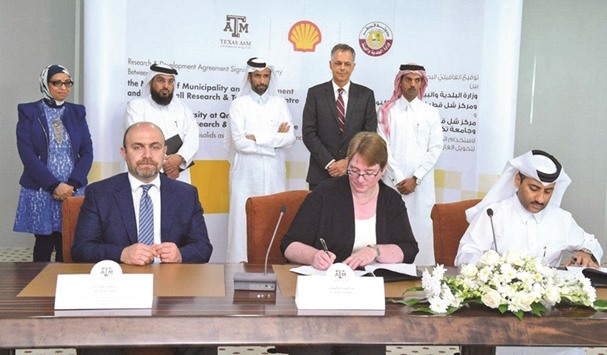The Ministry of Municipality and Environment (MME), Texas A&M University at Qatar (Tamuq) and the Qatar Shell Research and Technology Centre (QSRTC) have signed three-year research and development (R&D) agreements exploring the use of Pearl Gas to Liquids (GTL) biosolids, for the production of fodder crops at the ministry’s experimental farm in Rawdat Al Faras.
The signing ceremony took place at the MME and was attended by Sheikh Dr Faleh bin Nasser al -Thani, the assistant undersecretary for Agricultural Affairs, Livestock and Fisheries, interim Tamuq dean Dr Ann L Kenimer, and Michiel Kool, the managing director and chairman of Qatar Shell Companies.
Biosolids are the byproduct of a biological water treatment process at Pearl GTL whereby living micro-organisms, rather than chemicals, treat the industrial water produced in the gas-to-liquids conversion process.
Global uses of biosolids include application as a soil enhancer to improve and maintain productive soils, stimulate plant growth and increase water retention. They are also used as a soil enhancer in gardens and parks.
The agreements will focus on research on the feasibility of using Pearl GTL biosolids as soil enhancer for growing fodder crops, and evaluating their environmental impact and benefits in terms of improving the soil composition in Qatar.
Sheikh Dr Faleh said “At the ministry we aim for inclusive and sustainable growth for future generations in Qatar. That is why we are delighted to collaborate with QSRTC and Tamuq to explore the suitability of use of Pearl GTL biosolids in agriculture to improve soil properties in Qatar.”
Kenimer said: “This research collaboration with QSRTC and MME aims to identify sustainable and economically beneficial solutions for industrial by-products. This project aligns with Texas A&M University at Qatar’s research priorities and supports Qatar’s quest to become a knowledge-based economy.”
Kool said: “We are extremely proud to once again collaborate with the ministry and Texas A&M at Qatar. This agreement builds on our existing 10-year R&D collaboration agreement with the Department of Agriculture, which includes the Rawdat Al Faras research farm.”

MME, Tamuq and QSRTC officials signing the agreements.
